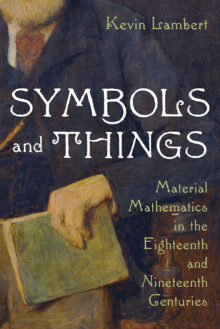
Kevin Lambert
Kevin Lambert is a historian of science and mathematics and professor in the liberal studies department at California State University, Fullerton.
Symbols and Things
Material Mathematics in the Eighteenth and Nineteenth Centuries
In the steam-powered mechanical age of the eighteenth and nineteenth centuries, the work of late Georgian and early Victorian mathematicians depended on far more than the properties of number. British mathematicians came to rely on industrialized paper and pen manufacture, railways and mail, and the print industries of the book, disciplinary journal, magazine, and newspaper. Though not always physically present with one another, the characters central to this book—from George Green to William Rowan Hamilton—relied heavily on communication technologies as they developed their theories in consort with colleagues. The letters they exchanged, together with the equations, diagrams, tables, or pictures that filled their manuscripts and publications, were all tangible traces of abstract ideas that extended mathematicians into their social and material environment. Each chapter of this book explores a thing, or assembling of things, mathematicians needed to do their work—whether a textbook, museum, journal, library, diagram, notebook, or letter—all characteristic of the mid-nineteenth-century British taskscape, but also representative of great change to a discipline brought about by an industrialized world in motion.

